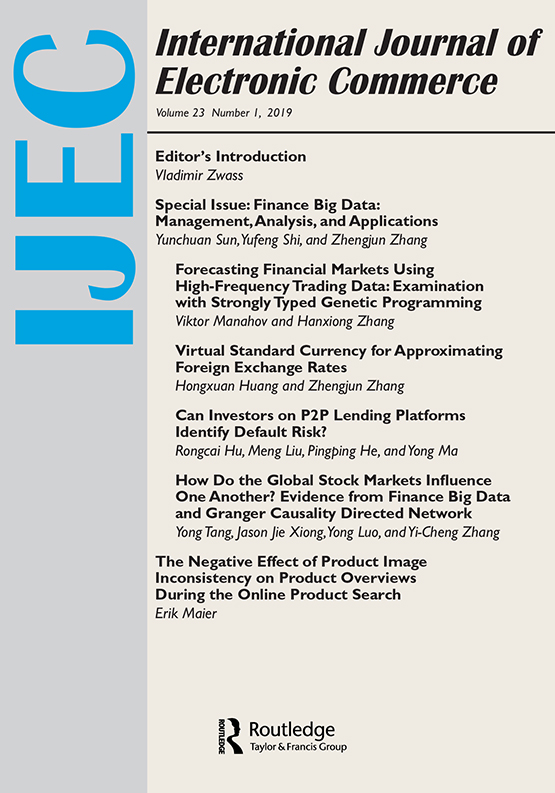The Impact of Discrepancies between Offerors’ Self-Disclosure and Customers’ Reviews on Online Sales of Experiences in Sharing Economy
IF 3.8
3区 管理学
Q2 BUSINESS
International Journal of Electronic Commerce
Pub Date : 2023-09-20
DOI:10.1080/10864415.2023.2255109
引用次数: 0
Abstract
ABSTRACT Experience sharing is becoming popular as customers increasingly respond to the rapid platform technology development. However, because of format diversity and quality variation, customers refer to multiple information sources before booking. Two of the most important information sources are the hosts’ self-disclosure texts about the experience project and customers’ online reviews. Using natural language processing (NLP) techniques, we analyze the data from Airbnb experience projects. We find that the information discrepancies in hosts’ self-disclosure texts of the experience project and customers’ online reviews, in terms of their focus on the attributes of products and services and the linguistic styles, exist, and these discrepancies affect sales. Hosts elaborate more on the descriptive attributes, whereas customers focus mainly on individual perceptions in their reviews. Customers also write online reviews in a more concise, diverse, and relaxed fashion, conveying positive emotion and a more subjective tone than expressed by hosts’ project descriptions. Additionally, a large topic difference, reflected by customers’ more details about various attributes elaborated in their online reviews compared with the attributes described by the hosts in the project description, increases sales. Further, a larger discrepancy in length and diversity increases sales, whereas a larger discrepancy in subjectivity reduces sales. Compared with the online mode, the in-person mode strengthens the impact of content and linguistic discrepancies on sales. This study’s findings will help hosts and sharing economy platforms use a relative approach to optimize their information provision and exploit the electronic word-of-mouth effect to improve customers’ online purchase intention and behavior.共享经济条件下供方自我披露与顾客评价差异对在线体验销售的影响
摘要随着平台技术的快速发展,用户对体验分享的反应越来越强烈。然而,由于格式的多样性和质量的变化,客户在预订前参考了多个信息源。两个最重要的信息来源是房东关于体验项目的自我披露文本和客户的在线评论。使用自然语言处理(NLP)技术,我们分析了来自Airbnb体验项目的数据。我们发现,体验项目主持人自我披露文本与顾客在线评论在关注产品和服务属性以及语言风格方面存在信息差异,这些差异影响了销售。主持人更多地阐述描述性属性,而客户主要关注他们评论中的个人看法。与主持人的项目描述相比,客户的在线评论也更加简洁、多样、轻松,传达了积极的情绪,也更加主观。此外,与项目描述中主机描述的属性相比,客户在在线评论中详细阐述了各种属性,这反映了较大的主题差异,从而增加了销售额。此外,长度和多样性差异越大,销量就会增加,而主观性差异越大,销量就会减少。与线上模式相比,面对面模式强化了内容和语言差异对销售的影响。本研究的发现将有助于房东和分享经济平台使用相对的方法来优化他们的信息提供,并利用电子口碑效应来提高客户的在线购买意愿和行为。关键词及短语:信息提供在线自我披露在线评论体验分享共享经济文本挖掘体验经济在线平台披露声明作者未报告潜在利益冲突。补充材料本文的补充数据可在https://doi.org/10.1080/10864415.2023.2255109Additional information网站上获取。作者王轶如(yiru.wang@oswego.edu)是纽约州立大学奥斯威戈分校市场营销学助理教授。她拥有肯特州立大学市场营销博士学位。他的研究兴趣集中在平台经济,包括在线口碑,用户平台互动和共享经济。她曾在《广告研究杂志》和《公共卫生》等杂志上发表文章。郑一龙(zhengy@merrimack.edu),美国梅里马克学院市场营销学助理教授。他持有纽约州立大学宾厄姆顿分校的市场营销博士学位。郑博士的研究主要集中在众包、创业营销、数字分析教育和葡萄酒营销中的集体智慧。他曾在《计算机与人类行为》、《商业研究杂志》、《信息系统问题》和《营销教育评论》等期刊上发表文章。徐迅(xunxu@csudh.edu;通讯作者),加州州立大学多明格斯山分校工商管理与公共政策学院信息系统与运营管理系副教授。他拥有华盛顿州立大学运营管理博士学位。他的研究兴趣包括服务运营管理、供应链管理和协调、可持续发展、电子商务、数据和文本挖掘以及酒店和旅游管理。在《决策科学》、《决策支持系统》、《欧洲运筹学杂志》、《信息与管理》、《国际电子商务杂志》、《国际酒店管理杂志》、《国际信息管理杂志》、《国际生产经济学杂志》、《国际生产研究杂志》、《运筹学学会杂志》、《旅行研究杂志》、《欧米茄》、技术创新等。
本文章由计算机程序翻译,如有差异,请以英文原文为准。
求助全文
约1分钟内获得全文
求助全文
来源期刊

International Journal of Electronic Commerce
工程技术-计算机:软件工程
CiteScore
7.20
自引率
16.00%
发文量
18
审稿时长
>12 weeks
期刊介绍:
The International Journal of Electronic Commerce is the leading refereed quarterly devoted to advancing the understanding and practice of electronic commerce. It serves the needs of researchers as well as practitioners and executives involved in electronic commerce. The Journal aims to offer an integrated view of the field by presenting approaches of multiple disciplines.
Electronic commerce is the sharing of business information, maintaining business relationships, and conducting business transactions by digital means over telecommunications networks. The Journal accepts empirical and interpretive submissions that make a significant novel contribution to this field.
 求助内容:
求助内容: 应助结果提醒方式:
应助结果提醒方式:


